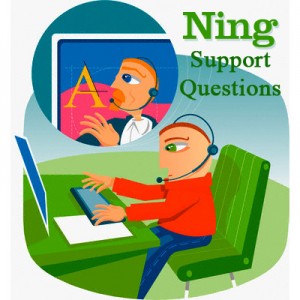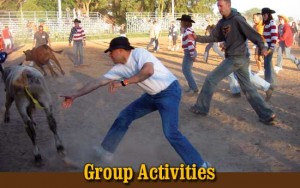Daniel Ben-Horin, CEO of TechSoup Global, wrote a guest post on TacticalPhilanthropy.com about “Collaboration, Innovation and Noise,” in which he said:
No one is forced to follow anyone or friend anyone. Think of the numbers in context. What does it mean to have 200,000 Twitter followers? Are they the kind of followers who follow a thousand other Twitterers (which is the same as following no one at all)? And, always, come back to what do you yourself enjoy and find meaningful in interacting with others using new tools.
Configuring your social media practice to your interests and personality is a dynamic process; at the beginning, it feels overwhelming but soon you find your way. As the popular metaphor goes, social media is a rushing river; your words, wise or foolish, will disappear (only to be resurrected when you run for the Senate). What will truly build and what may last are relationships and ideas.
I certainly value relationships, and I especially love strong ones. However, there is an influential social network theory called “the strength of weak ties,” created by Sociologist Mark Granovetter, of Stanford University. The theory explains the surprising value of relatively superficial relationships. The theory may apply to social media.
For networking purposes “weak ties” can be more helpful than strong ties, because they connect us to resources and information we would not otherwise know about. Close friends tend to know the same people and things we know. “Weak” ties, i.e., friends who are less close, are more useful when it comes to searching for new jobs, ideas, experts, and knowledge.
Weak ties require less “maintenance” and therefore are less time consuming. People can keep up with more weak ties without them being a burden. Although nothing can substitute for the intrinsic value of strong relationships, there is also a value in having many “weak” “ones.
Posted in Business Relationships Internet Tribe Relationships by .
Jun 10
27
Relationships According to Einstein
Here’s food for thought from one of the world’s greatest thinkers. In his essay, The World as I See It , Albert Einstein wrote: (on relativity
, Albert Einstein wrote: (on relativity
…without deeper reflection one knows from daily life that one exists for other people — first of all for those upon whose smiles and well-being our own happiness is wholly dependent, and then for the many, unknown to us, to whose destinies we are bound by the ties of sympathy. A hundred times every day I remind myself that my inner and outer life are based on the labors of other men, living and dead, and that I must exert myself in order to give in the same measure as I have received and am still receiving…
Anthony Robbins says,
Some of the biggest challenges in relationships come from the fact that most people enter a relationship in order to get something. They’re trying to find someone who’s going to make them feel good. In reality, the only way a relationship will last is if you see your relationship as a place that you go to give, and not a place that you go to take.
Posted in Uncategorized by .
 “We may enjoy online relationships using social media sites like Facebook or Twitter, for example, but the difference between these kinds of interactions and interactions with people in the physical world is clearly vast,” according to Alex Lickerman, M.D. In his recent article in Psychology Today, Dr. Lickerman wrote:
“We may enjoy online relationships using social media sites like Facebook or Twitter, for example, but the difference between these kinds of interactions and interactions with people in the physical world is clearly vast,” according to Alex Lickerman, M.D. In his recent article in Psychology Today, Dr. Lickerman wrote:
As long as we expect no more from these online relationships than they can give, no good reason exists why we can’t enjoy the power of social media sites to connect us efficiently to people we’d otherwise not touch. The problem, however, comes when we find ourselves subtly substituting electronic relationships for physical ones or mistaking our electronic relationships for physical ones. We may feel we’re connecting effectively with others via the Internet, but too much electronic-relating paradoxically engenders a sense of social isolation.
In response to the article mentioned above, Alexandra Samuel (a frequent contributor to the Harvard Business Review) chose to accentuate the positive benefits of social media. In her blog post entitled, “4 Ways Online Communication Can Build Relationships,” she wrote:
In a world of job changes and social mobility, it’s easier to socialize with the friends in town than the pal who has known you since college. But nothing substitutes for old friends — and if there’s one thing that Facebook has done brilliantly, it’s the way so many of us are now back in frequent contact with the friends we knew in previous lives. Invest in regular check-ins with your old and dear friends, even if those friendships have lapsed; after a few months of loose contact by Facebook and Twitter, looking at each other’s news and family photos, you’ll be ready to pick up the phone or plan a visit.
See my previous post: “Social Media May Help Save Abandoned Treasure!”
Posted in Family Relationships Platonic Friends Romantic Relationships by .
Jun 10
25
True Friends Help Each Other
 Friendship in real life is a never ending circle of love and mutual support. Friends want to help each other without keeping score. They just care and want to help. Reciprocity comes naturally and without obligation. When I think of all the many things that friends have done for me and that I have done for friends, I wonder what we can do for each other online… Surely there are things we can do for each other online, but consider some of the examples of offline friendship in action: (abreviated here, but very important at the time)
Friendship in real life is a never ending circle of love and mutual support. Friends want to help each other without keeping score. They just care and want to help. Reciprocity comes naturally and without obligation. When I think of all the many things that friends have done for me and that I have done for friends, I wonder what we can do for each other online… Surely there are things we can do for each other online, but consider some of the examples of offline friendship in action: (abreviated here, but very important at the time)
1) helping hands when moving — I’ve helped and been helped on numerous occasions
2) transportation to and from airports, and staying overnight in home
3) coming to rescue when out of gas or battery dead or car breakdown
4) tech support for computer and internet challenges
5) loan of money on short notice of emergency need
6) ride to the emergency room and accompany all day in waiting room
7) Audio/Video assistance for meetings and meetups
8) videography and editing for a friend’s website
9) allowing a homeless friend to live for awhile in our home
10) visiting in the hospital and bringing clothes and books, etc.
I am trying to learn how we can be there for each other online, because being there for each other is an integral part of real friendship and real relationships.
Jun 10
24
Relationship Overload
Are Meetups and “Speed Networking” a Waste of Time?
“This Could be the Start of a Beautiful Relationship” from the movie Casa Blanca
Real relationships are precious treasures, but those of us who spend a lot of time “networking” tend to accumulate a backlog of contacts that may seem overwhelming. Meeting people is only the beginning of a relationship. The fortune is in the follow-up!
Many “seeds” are scattered and wasted. My desk often gets cluttered with business cards, and my address books and contact management software are loaded (maybe “overloaded”).
The Company Line Blog has a helpful post about networking. Here is an excerpt:
- Control conversations by asking others questions about themselves, genuinely listening to what they have to say, and modifying your elevator pitch to integrate key points of the conversation in a way that solves one of their problems or creates a value added benefit for their clients.
- Think about networking as an avenue to build long-term relationships.Therefore, follow up with each person in a way that keeps you top of mind and relevant to their interests. (i.e., thank you cards, e-mail, LinkedIn, Twitter, Facebook, send related articles, request a coffee chat, etc.)
The Fortune is in the Follow Up
I am doing some soul searching as we “speak.” Personally, I enjoy meeting new people more than I enjoy following up. From a relationship building point of view that seems backwards. I act like Johnnie Appleseed, planting new seeds everywhere I go — in the hope that they grow. My unconscious philosophy is that “some will fall on fertile soil and some will fall on rocky ground.” I have to remind myself that nurturing special relationships is like cultivating a garden. Flowers will bloom after a season of watering and fertilizing. Relationships depend on follow-up.
Posted in Business Relationships Personal Alliances Social Media Relationships by .
Jun 10
24
Real Relationships Online
“Real relationships” can be online OR offline. When I describe my mission to “turn friends and followers into real relationships,” I do not necessarily mean to move them offline, as in the movie You’ve Got Mail.
 Online relationships can be very real, as illustrated by the article excerpted below, which (surprisingly) was written decades ago, when “social media” meant primarily AOL chat rooms!
Online relationships can be very real, as illustrated by the article excerpted below, which (surprisingly) was written decades ago, when “social media” meant primarily AOL chat rooms!
One of my closest friends died not long ago. She was 30 years old, lived in Edmonton in Canada, had a wicked sense of humor, and a deft way of making everyone in a room feel welcomed and noticed.
One of the keenest parts of my loss is that I’ll never get to meet her. You see, Maur was an online friend. Although I spent more time with her than many of my ‘body’ friends, we communicated only via chat rooms on the Internet, and I hadn’t had the chance to meet her in the flesh. Now I never will.
Think about it: what distinguishes online relationships from offline? They’re free from the limits of geography; they have an element of anonymity; and they usually come minus a whole raft of assumptions, prejudices and preconceptions we bring to our offline relationships.
For instance, it’s not uncommon to have no knowledge of the gender, age, skin color, weight, physical attractiveness – whatever that is! – or physical disabilities of the person you meet online. Frequently, by the time you do get to discover all these things, you know the person so well that these details gain the insignificance they so richly deserve. What a liberation!
But if you compare offline relationships to online, you can’t say one type is real and the other not. It’s simply not true. They each have their advantages and their disadvantages. It’s just that online relationships are a whole new area of human interaction, one that we’re still sorting out.
If you think this issue doesn’t affect you, think again. Something very profound is happening online and in the long run it will affect us all. Already there are millions of people who regularly chat online. By the year 2001, it’s predicted that one billion people will be connected to the Internet worldwide. No matter what your level of knowledge or ignorance, the Internet is going to be a part of your future.
Posted in Platonic Friends Romantic Relationships by .
Jun 10
23
Relationships at a Distance
 I love my son Art, and I’m very proud of him. Honestly, I wish our relationship were much closer. My challenge is that he lives at a distance of literally thousands of miles, and I find it difficult to keep in touch. It is my fault. I am shy about expressing my feelings. I have procrastinated far too long about connecting with him. The internet and social media may offer help. This is one reason I am eager to learn how to build real relationships online.
I love my son Art, and I’m very proud of him. Honestly, I wish our relationship were much closer. My challenge is that he lives at a distance of literally thousands of miles, and I find it difficult to keep in touch. It is my fault. I am shy about expressing my feelings. I have procrastinated far too long about connecting with him. The internet and social media may offer help. This is one reason I am eager to learn how to build real relationships online.
My son plays guitar in Japan. He is very good at it! Listen to him play “I Got Rhythm“: (CLICK HERE) http://www.youtube.com/user/arthodges#p/a/u/1/z-B4bvEsFSM Please help me surprise my son on his birthday by sending him Facebook Fans. Please visit his Fan Page at: http://www.facebook.com/pages/Art-Hodges-Music/308374636701
By following my son on social media, I hope to get to know him better and to nurture our relationship.
Jun 10
21
Relationship Empowerment
Relationships with leaders who are “centers of influence,” can empower us to take social networking to a higher level. It’s wise to reach out to our heroes and ask to become their friend. Let’s not be shy when we have the opportunity to connect with those who have blazed the trail we want to follow. Mentors can not only teach us what they have learned but can also introduce us to others with whom they have relationships. After connecting, remember that to make a friend, be a friend.
The Senior Market Advisor blog has a helpful post about Finding Your Centers of Influence.
In his excellent blog, Personal Development for Smart People, Steve Pavlina wrote:
To escape mediocrity requires that you surround yourself with the exceptional. Steal time from your mediocre relationships, and invest it in building new relationships with people you find extraordinary. Join clubs and organizations you’re just barely qualified to join. Apply for a job where you’ll be surrounded by highly competent people. Join a gym that intimidates you. Volunteer for assignments that allow you to work with higher caliber people, even if you do it for free.
Once you meet such people, find ways to do favors for them. Give, expecting nothing in return. Build the relationship first, even if it seems very unbalanced in the beginning. The energy of such people will rub off on you. And with enough rubbing, you’ll have raised your own energy and awareness enough to reach escape velocity and break out of mediocrity.
Posted in Business Relationships Internet Tribe Relationships Personal Alliances by .
Jun 10
20
Relationships in Camelot
Relationships come in many varieties. All are important. Camelot, the movie or the play, dramatically demonstrates the dominant role that relationships play in life. The drama revolves around conflicts between marital loyalty, Platonic friendship (King Arthur and Sir Lancelot), military alliances (the “Round Table”), sexual desire and romantic love (Lancelot and Queen Guinevere).
The dream of the great society of chivalrous friendship and mutual protection and cooperation by the knights was destroyed by the dark forces of jealousy, resentment, and revenge by the rejected illegitimate son, Mordred. The “Dark Ages” followed. What might have been the ideal civilization was brought down by the power of relationships!

Jun 10
19
Social Networking may Lead to Love
Online Relationships
Love begins with contact, online or offline. I have several personal friends who met strangers online, developed relationships, and have been happily married for a decade or more to persons they met online. One happy couple met playing cards online. Those relationships are worth a thousand other Facebook Friends. The key is that they turned contacts into relationships.
“The Greatest of These is Love”
Love is more precious than any material things. My parents set a wonderful example of love for each other, for their children, and for many other people. I will always remember the following passage from St. Paul’s letter to the Corinthians, quoted at my mother’s funeral:
“If I speak in the tongues of men and of angels, but have not love, I am only a resounding gong or a clanging cymbal. If I have the gift of prophecy and can fathom all mysteries and all knowledge, and if I have a faith that can move mountains, but have not love, I am nothing…Love is patient, love is kind. It does not envy, it does not boast; it is not proud. It is not rude, it is not self-seeking, it is not easily angered; it keeps no record of wrongs…It always protects, always trusts, always hopes, always perseveres…these three endure: faith, hope, and love. But the greatest of these is love.” 1 Corinthians 13
Posted in Family Relationships Romantic Relationships by .
Jun 10
18
Help From Our Friends
I love the lyrics of songs of friendship and love, like “You Needed Me,” and “We All Need Somebody To Lean On.” I think they convey in poetry and music the positive interdependence of social beings. One of my favorites, by the Beatles:
Do you need anybody,
I just need somebody to love,
Could it be anybody,
I want somebody to love.
I get by with a little help from my friends,
Yes I get by with a little help from my friends…
Jun 10
17
Interdependent Relationships
Relationship interdependence is about making connections and becoming allies or forming partnerships with other human beings. Relationships are inherently interdependent. Of course, they have value, per se, in the emotional realm. Above all, friendship is good for its own sake! But relationships also involve being there for each other in times of need. An indication of the importance of interdependence is the endurance for 24 centuries of the quotation, “A friend in need is a friend indeed,” from Quintus Ennius, 3rd Century B.C.! This important quote is subject to several interpretations, all of which are desirable.
There are times when interdependence clearly beats independence, and thankfully, relationships are strengthened as a byproduct. For example, when I sprained my foot and could hardly walk on it. I was in pain with no cane–kind of like being “up the creek” with no paddle! My loving wife brought me a basin of Epsom salt to reduce the swelling, together with ActivOn topical analgesic, and a beer.
“In his game-changing book, Seven Habits of Highly Effective People, Stephen Covey said, “The reality is that we are interdependent, and the independent model is not optimal for use in an interdependent environment that requires leaders and team players.” Mahatma Ghandi said, “Man is a social being. Interdependence is and ought to be as much the ideal of man as self-sufficiency.”
Posted in Family Relationships Internet Tribe Relationships Personal Alliances by .
 Relationship cultivation is like growing a rose garden. And I did “promise you a rose garden!” The relationship must be nurtured or else it will whither. Note the fact that it is no accident that the strength of a friendship or family relationship may increase or decrease over time.
Relationship cultivation is like growing a rose garden. And I did “promise you a rose garden!” The relationship must be nurtured or else it will whither. Note the fact that it is no accident that the strength of a friendship or family relationship may increase or decrease over time.
It is very sad when “the illusive butterfly of love” flies away, or when we lose touch with old friends or family. This subject calls to mind the lyrics from the Simon and Garfunkel song, “Someone left the cake out in the rain! I don’t think that I can make it; ’cause it took so long to bake it, and I’ll never have the recipe again!”
InSeven Habits of Highly Effective People, Stephen Covey describes a metaphor called the “Emotional Bank Account.” It is a helpful guide to growing a healthy relationship. It is wise to be proactive in making deposits before the need to withdraw, because emotional “withdrawals” are often unexpected accidental emergencies!
Jun 10
15
Social Media and Magnetic Attraction
Magnetic Personality
Attractive personality characteristics, like charm and charisma, normally radiate naturally from the authentic heart of a person. Although charm and charisma are powerful leadership qualities, attempting to display them deliberately is risky. Appearing phony or self-conscious would be counter-productive for a wannabe leader. Sincerity is just as powerful and attractive as charisma.
According to the the dating and relationship blog, CharismaMatters.com,
“love is not difficult to find…attract love like a magnet…every one of us is a walking magnet and our thoughts, words, actions and feelings (”vibrations”) attract to us those people, things and situations that are a match to our vibrations, whether wanted or unwanted.”
Becoming an inspiring leader is more about being than doing. If one wishes to acquire charisma, I suggest beginning by working on empathy and self-esteem. These topics are worthy of further consideration at another time.
Non-Verbal Communication
Online venues, like social media, for expressing our personalities or for “being” charismatic are limited by the verbal nature of the medium. See my post below on “Non-Verbal Communication.” However, let’s not give up too easily. Let’s look for opportunities to be “charming” online.
Videos and audio podcasts obviously add more non-verbal communication, but even our “behavior” in verbal interactions can convey our “heart.”
FREE Video Conferencing with Google Hangouts
Google has recently introduced a wonderful free service called Google Hangout. You can use your webcam to video conference with up to 10 people in up to 10 different locations! You can even broadcast your conference live to an unlimited audience (like owning your own TV Channel) and record it for future replay. Any of the 10 can share their computer screens and/or draw on a virtual whiteboard. For more information and training tutorial videos, go to: http://LearnGoogleHangouts.com
Non-Verbal Communication 93% / 7%
Almost every facet of our personality is revealed through our appearance, our body language, our gestures, our facials expressions, our overall demeanor, and our posture and movements.
It can include your attire, tone of voice, clearing your throat, rubbing your eyes, crossing your arms, tapping your toes, scratching your nose. Eye contact, or lack thereof, gestures, crossed legs, open arms, and the scent we transmit are all forms of non-verbal communication. Through your choice of clothing, hairstyle, glasses, accessories, and makeup if applicable, your appearance also communicates a strong message.
Interpersonal “Chemistry”
Online Video Provides the Best Compromise
Fortunately, social networks have recently added LIVE video streaming apps and “Stories” as well as video conferencing tools. These are the next best thing to being there.

Posted in Business Relationships Family Relationships Romantic Relationships by .
Jun 10
13
Social Media Communication
Ralph Waldo Emerson said, “Your actions speak so loudly, I can’t hear what you say.” Now that millions of people want to communicate on the internet, what kind of actions are going to be “speaking” for us?
Probably the most important action is to reply and respond when someone contacts you, e.g., by Facebook message or comments on your blog or your “wall.” It is the virtual equivalent of “investing attention” or recognition. You show respect and interest in them, and you continue the virtual conversation.
You also gain favor by commenting on their walls, or by linking to their blogs.
By keeping “in touch” online you communicate your interest in the other person. The point here is that is not so much the words you write that count as much as it is the fact that you cared enough about the other person to communicate. We don’t really communicate with “walls” or blogs, we actually communicate with people! People want to know that they’re important to you.
Jun 10
12
Relationships are Better Than Money
If you had unlimited wealth, wouldn’t you like to share some? The good news is that you DO have a virtual fortune in gems that are better than money!
Pay attention! Here is the secret of successful leadership…pay attention!
Rather invest attention. Attention and recognition are better than money. Psychologists believe that attention and recognition are primary needs, like food and water. Understanding this secret can be the key to your success as a leader. Knowing this secret helped Mary Kay build a billion dollar empire. She said, “There are two things that people want even more than sex and money: recognition and praise.”
Sincere praise costs the giver very little, but it is precious to the receiver. What a fantastic bargain! For maximum return on investment (ROI), invest attention.
That which gets rewarded gets repeated! Attention, approval, and recognition are powerful rewards. In addition to reinforcing good behavior, these rewards have the added benefit of increasing the self-esteem of both the giver and the receiver — producing long term personality benefits. They also help to bond relationships!
Do you remember occasions when you were given recognition or praise? Out of all the millions of hours in a lifetime, a small number of special real moments stand out in our memory. We feel good every time we think about them. Someone said, “It is not the number of breaths you take that counts; it’s the number of moments that take your breath away!”
Posted in Uncategorized by .
“Social Treasure” is too often taken for granted and neglected. Unfortunately, we often let precious relationships die on the vine, while we are distracted by mundane trivia or focused on seeking more new contacts. As a man, I was never a Girl Scout or a Campfire Girl 
The “land of the free” is also the home of the mobile. We often move and leave friends and business contacts behind — out of sight, out of mind. What a waste of invested deposits in “emotional bank accounts.” What a sad loss of valuable social capital! It takes a long time to make an old friend! It is so special to be able to say, “we go waaaay back!”
I hope that new web tools and social networking services will help us keep in touch with old friends. However, as with any tools, it is up to the human operator to use them effectively.
Posted in Family Relationships Platonic Friends by .
Jun 10
10
Relationship Leverage
Leverage is the key to major success in any endeavor. There are many kinds of leverage. Leveraging “social capital” is my favorite! When you leverage relationships, we call it “networking.” You are actually leveraging trust and influence, as well as knowledge, resources, and contacts.
It is similar to leveraging financial capital — like you do when you buy a $500,000. house with $25,000. down. If it appreciates 5 % per year, your equity increases by $25,000., i.e., you make 100% annual interest on your investment!
Although 5% appreciation is a normal average in real estate, in these particular economic times, it is a safer bet to leverage “social capital.” In many situations it is “who you know that counts.” I always add that it is also “how they feel about you that counts!”
Cultivating a relationship is like growing a rose garden; it takes time and nurturing or else it whithers. Investing in a relationship is like making deposits in an emotional bank account. It is wise to be proactive in making plenty of deposits before you need to withdraw!
Please don’t misunderstand me! This is NOT a matter of being cold and calculating. The best (and most valuable) deposits are made without any thought of personal gain. Sincere compassion and interest in other people is more effective than keeping score. Just caring and sharing what you have to give is the way to earn social capital, and also the way to be happy. As the song says, “Make someone happy, and you will be happy too!”
Posted in Business Relationships Personal Alliances by .
Social Media provide new, and perhaps more efficient, tools for communication, but let’s not forget what they’re for! Social media is bringing relationships back to business.
An interesting article in Search Engine Guide reminds me of the movie, Back to the Future. In her post, “How Social Media (Didn’t) Change Business,” Jennifer Laycock points out that “Smart Companies are in it for the People.” She says:
Social Media isn’t some amazing new concept that’s changing the way we do business. It’s simply amazing new technology that’s allowing us to return to the way people USED to do business. In the last fifty years we’ve gone from business being done the way my grandfather did it, to business being run by multi-national corporations who view you as a billing number and who you pick based on price. In the last five to ten years, the Internet has opened things back up.
Social Media gives you, as a small business owner, the tool to make and build relationships with people all over the world. The trick, is to focus on the relationship and not the sale. People are happy to buy from people they like and trust.
Posted in Business Relationships by .
Jun 10
8
Belonging in Social Media Groups
“Belonging” is one of the more basic needs in Mazlow’s Hierarchy of human needs, where it comes just above health and safety. Fulfillment of the need for belonging can be satisfied by social media groups and online tribes, such as “the Unified Tribe.” People are basically social beings!
Of course, membership in groups and tribes can also fulfill other needs, like achievement, self-esteem and confidence. Synergy is a powerful phenomenon. Often, one plus one equals three or more! Interaction causes the whole to become more than the sum of it’s parts.
Indeed, some things are only possible when a large number of people participate. The Internet is a prime example. Main stream media, like television and radio could not afford to produce broadcasts without a large audience. Even telephones and fax machines would be of little use unless a lot of people joined the user group.
Posted in Internet Tribe Relationships Personal Alliances Platonic Friends by .
Jun 10
8
Relationship Community
A “community” is basically a social group sharing an environment. During most of human history, people were born into their community — their physical or social environment, (perhaps their caste or class). More recently membership in a community has become a matter of choice.
Many people choose an “intentional community” in the physical world or a “virtual community” in cyberspace. I am grateful for the privilege to choose! Groups on Facebook and “tribes,” such as Katie Feiling‘s “the Unified Tribe” are virtual communities.
Posted in Uncategorized by .
Jun 10
6
How to Find Friends
Lasting friendships usually begin with shared interests. One of the quickest and easiest ways to find friends is to participate in groups and activities in which you are sincerely interested. Conversation is easy and comfortable when you interact with others who are interested in the same things. You can act naturally and be your authentic self, and you will attract the kind of people who will like the real you.
Thanks to the internet there is no excuse to remain lonely! Social networking sites and matchmaking services make it easy to find friends online. One of my favorite websites is meetup.com, which offers the best of both worlds — online and offline. You can search and select from hundreds of interest categories in thousands of locations.
What is relatively unique about meetup.com is that after you find the group online, you actually meet up in person ( irl :). Simultaneously, you meet numerous people who share your same interests — all at the same time. Although it is only one of the ways to find friends online, it is an efficient way to sort from millions of netizens, the ones who both live near you and share your interests, too.
Jun 10
6
Get Lucky!
“People who need people are the luckiest people in the world,”
according to Barbara Streisand’s song fr
om
Funny Girl. It’s a beautiful song!
To hear Barbara sing it, click here (mp3).
I say, if you want to get lucky and be in the
right place at the right time, be in a lot of places!
Posted in Romantic Relationships by .


